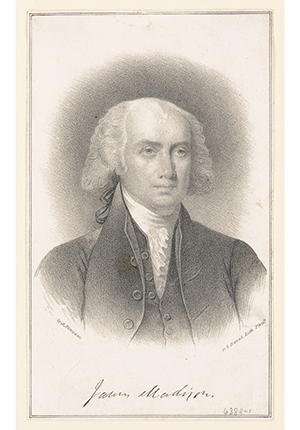Historic Document
Federalist 55 (1788)
James Madison | 1788

Library of Congress, Prints and Photographs Division
Summary
On February 15, 1788, James Madison published Federalist 55—titled “The Total Number of the House of Representatives.” Following Shays’ Rebellion in Massachusetts, Madison and his allies pushed for a new Constitution that might address the dangers of excessive democracy, including mob violence. In Federalist 55, Madison addressed a range of important issues, including the proper size of the House of Representatives, the role of representation in a republican government, and the importance of civic republican virtue. Madison warned, “In all very numerous assemblies, of whatever character composed, passion never fails to wrest the sceptre from reason. Had every Athenian citizen been a Socrates, every Athenian assembly would still have been a mob.” Madison had in mind a specific episode in ancient history—the push by the demagogue Cleon to mislead the massive Athenian Assembly (filled with 6,000 people) into starting the Peloponnesian War. With the new Constitution, the Framers sought to create a new government strong enough to achieve common purposes, but restrained enough that it would not threaten individual rights.
Selected by

The National Constitution Center
Document Excerpt
THE number of which the House of Representatives is to consist, forms another and a very interesting point of view, under which this branch of the federal legislature may be contemplated. Scarce any article, indeed, in the whole Constitution seems to be rendered more worthy of attention, by the weight of character and the apparent force of argument with which it has been assailed. The charges exhibited against it are, first, that so small a number of representatives will be an unsafe depositary of the public interests; secondly, that they will not possess a proper knowledge of the local circumstances of their numerous constituents; thirdly, that they will be taken from that class of citizens which will sympathize least with the feelings of the mass of the people, and be most likely to aim at a permanent elevation of the few on the depression of the many; fourthly, that defective as the number will be in the first instance, it will be more and more disproportionate, by the increase of the people, and the obstacles which will prevent a correspondent increase of the representatives.
In general it may be remarked on this subject, that no political problem is less susceptible of a precise solution than that which relates to the number most convenient for a representative legislature; nor is there any point on which the policy of the several States is more at variance, whether we compare their legislative assemblies directly with each other, or consider the proportions which they respectively bear to the number of their constituents. . . .
Another general remark to be made is, that the ratio between the representatives and the people ought not to be the same where the latter are very numerous as where they are very few. Were the representatives in Virginia to be regulated by the standard in Rhode Island, they would, at this time, amount to between four and five hundred; and twenty or thirty years hence, to a thousand. On the other hand, the ratio of Pennsylvania, if applied to the State of Delaware, would reduce the representative assembly of the latter to seven or eight members. Nothing can be more fallacious than to found our political calculations on arithmetical principles. Sixty or seventy men may be more properly trusted with a given degree of power than six or seven. But it does not follow that six or seven hundred would be proportionably a better depositary. And if we carry on the supposition to six or seven thousand, the whole reasoning ought to be reversed. The truth is, that in all cases a certain number at least seems to be necessary to secure the benefits of free consultation and discussion, and to guard against too easy a combination for improper purposes; as, on the other hand, the number ought at most to be kept within a certain limit, in order to avoid the confusion and intemperance of a multitude. In all very numerous assemblies, of whatever character composed, passion never fails to wrest the sceptre from reason. Had every Athenian citizen been a Socrates, every Athenian assembly would still have been a mob. . . .
The true question to be decided then is, whether the smallness of the number, as a temporary regulation, be dangerous to the public liberty? Whether sixty-five members for a few years, and a hundred or two hundred for a few more, be a safe depositary for a limited and well-guarded power of legislating for the United States? I must own that I could not give a negative answer to this question, without first obliterating every impression which I have received with regard to the present genius of the people of America, the spirit which actuates the State legislatures, and the principles which are incorporated with the political character of every class of citizens I am unable to conceive that the people of America, in their present temper, or under any circumstances which can speedily happen, will choose, and every second year repeat the choice of, sixty-five or a hundred men who would be disposed to form and pursue a scheme of tyranny or treachery. . . .




